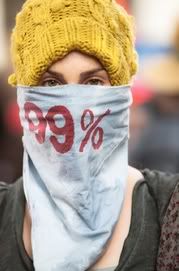Welcome to DU!
The truly grassroots left-of-center political community where regular people, not algorithms, drive the discussions and set the standards.
Join the community:
Create a free account
Support DU (and get rid of ads!):
Become a Star Member
Latest Breaking News
General Discussion
The DU Lounge
All Forums
Issue Forums
Culture Forums
Alliance Forums
Region Forums
Support Forums
Help & Search
General Discussion
Related: Editorials & Other Articles, Issue Forums, Alliance Forums, Region ForumsWill the Peasants Go Medieval on Bankers?

Wat Tyler leads the Peasant's Revolt against the feudal system
in London, 06/13/1381. (art: unknown)
By Washington's Blog
06 August 12
While everyone from Tony Blair to Nouriel Roubini is debating whether or not bankers should be hung, the Wall Street Journal and Bloomberg provide some fascinating historical context.
The journal's Jason Zweig reports:
Financial criminals throughout history have been beaten, tortured and even put to death, with little evidence that severe punishments have consistently deterred people from misconduct that could make them rich.
The history of drastic punishment for financial crimes may be nearly as old as wealth itself.
The Code of Hammurabi, more than 3,700 years ago, stipulated that any Mesopotamian who violated the terms of a financial contract - including the futures contracts that were commonly used in commodities trading in Babylon - "shall be put to death as a thief." The severe penalty doesn't seem to have eradicated such cheating, however.
...
http://readersupportednews.org/opinion2/279-82/12802-focus-will-the-peasants-go-medieval-on-bankers
Interesting history!

InfoView thread info, including edit history
TrashPut this thread in your Trash Can (My DU » Trash Can)
BookmarkAdd this thread to your Bookmarks (My DU » Bookmarks)
3 replies, 1094 views
ShareGet links to this post and/or share on social media
AlertAlert this post for a rule violation
PowersThere are no powers you can use on this post
EditCannot edit other people's posts
ReplyReply to this post
EditCannot edit other people's posts
Rec (2)
ReplyReply to this post
3 replies
 = new reply since forum marked as read
Highlight:
NoneDon't highlight anything
5 newestHighlight 5 most recent replies
= new reply since forum marked as read
Highlight:
NoneDon't highlight anything
5 newestHighlight 5 most recent replies
Will the Peasants Go Medieval on Bankers? (Original Post)
pinboy3niner
Aug 2012
OP
dballance
(5,756 posts)1. Don't forget harsh penalties/death penalty doesn't stop us from murder either
Hmm, perhaps the murders, the violent criminals and the banksters share the same sociopathy or psychopathy.
xchrom
(108,903 posts)2. Not in America. The peasants always think their THIS CLOSE
To being 1 of the Lords & Masters.
freshwest
(53,661 posts)3. I bought and read the book, 'The Peasant's Revolt' a few years ago and was greatly disappointed:

The Peasants' Revolt: England's Failed Revolution of 1381
The Peasants’ Revolt was the greatest mass rebellion in British history. Throughout June and July 1381, 60,000 men and women from as far afield as Yorkshire, Norfolk, and London rampaged across the country in response to the attempted collection of the hated “Poll Tax.” Towns such as London, Cambridge, Bury St Edmunds, and St Albans witnessed enormous disturbances in which local rivalries became enmeshed in the broader movement of resistance. The risings produced highly charismatic leaders, including William Grindecobbe, Wat Tyler, and John Wrawe (“The King of Suffolk”), although the rebels did not have a monopoly on charisma. The most dynamic personality of the entire revolt was the semi-psychotic Henry Despenser, Bishop of Norwich, who converted his household into a miniature army.
http://www.amazon.com/Peasants-Revolt-Englands-Revolution-Revealing/dp/0752429655/ref=sr_1_4?s=books&ie=UTF8&qid=1344290474&sr=1-4&keywords=The+Peasant+Revolt
Like the romanticized Spanish Civil War, the good guys don't always win. A more successful change was affected with the help of those farther up the social ladder, that in the long run benefited more than just themselves:
The Magna Charta Sureties, 1215: The Barons Named in the Magna Charta, 1215, and Some of Their Descendants Who Settled in America During the Early Colonial Years
At the signing of the Magna Charta, twenty-five men, representing the barons, signed as sureties of the baronial performance, in effect pledging the barons to fulfill their obligations to the Crown in accordance with the terms of the Great Charter. Of these twenty-five sureties only seventeen have identified descendants. Each of the seventeen is represented in the celebrated Magna Charta Sureties, which traces their connections-- line by line and generation by generation-- to approximately 150 American colonists.
It would be interesting to see if any of those 150 have entrenched themselves into or behind our government as it now exists and actually control a great deal behind the scenes that we are unable to interact with and gain concessions.
Change is difficult, and requires a lot of organization outside the political sphere. The right wing has used the institution of religion as an organizing force and it's proven very reliable. Most left wingers reject those associations, but have few of their own associations to oppose them.
That second book dealt with familial or birthright, that we may be seeing played out in politics today. These may be the people Carlin referred to when he said 'It’s a big club and you ain’t in it.' We still must do the best we can to survive.
Any suggestions?